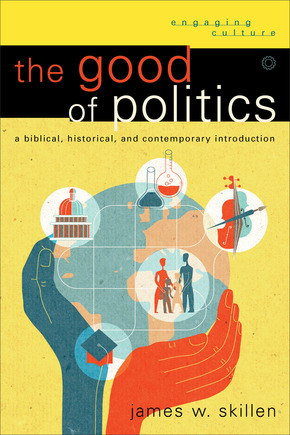The Good of Politics
A Biblical, Historical, and Contemporary Introduction
James W. Skillen
Grand Rapids: Baker Academic, 2014.
ISBN 978-0-8010-4881-4
Pbk, xxi + 214pp, £13.89
It's often said that religion and politics don't mix. It's also said that politics and religion should be avoided in polite conversation. In an interview for Vanity Fair magazine Tony Blair was asked about his Christian faith, Alistair Campbell, Blair's former communications Chief (aka spin doctor), immediately interrupted and said "I'm sorry, we don't do God".
Contrast this with a scene in the film Amazing Grace. William Wilberforce when considering giving up his political career for one in religion was visited by members of the Clapham Sect and Thomas Clarkson. Clarkson says to Wilberforce ‘We understand you are wondering whether to pursue politics or religion’. Hannah More responds: ‘We humbly suggest you can do both’.
That is the reformational response. We can serve God and do politics – in fact we can serve God in doing politics. Religion and politics do mix! In part this is why Skillen has written this excellent book, the title of which may seem to some Christians to be outrageous - how can politics be good?
His main aim is to show the creational role of politics and thus politics can be good. The current Christian consensus is that politics is a necessary evil. Skillen exposes this misunderstanding and ably shows the creational role of politics.
This misunderstanding has been prevalent since Augustine. Augustine suggested that institutions of government are unnatural and are permitted by God only in response to sin as both a punishment and a remedy for our sinful condition. If this is the case, as Skillen points out, then natural law cannot provide a basis for unnatural institutions. This Augustinian-perpetuated error stems from not having a strong enough view of creation. God created humans for political life and thus it can be good and it is ‘not a neutral terrain’ (p. 118).
Skillen shows the deficiency of the Augustinian perspective in the first two sections - biblical and historical. In the third and final section he looks at what Christian political involvement might look like. Here he surveys important topics such a economics, the environment, education, family and citizenship as vocation.
This is an important book, it should be read widely - and not just by Christians who have an interest in politics - but by every Christian who is touched by politics.
For my interview with Jim Skillen see here
The book is available in the States from Byron Borger's Heart and Minds Bookstore


No comments:
Post a Comment